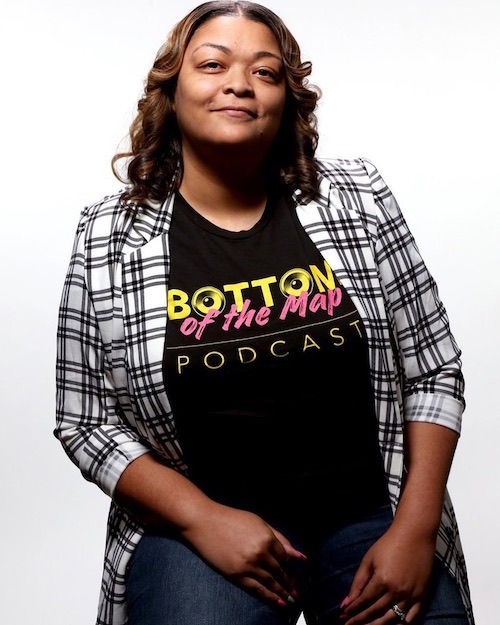Nov 24, 2020 | essay
Da Art of Speculatin’
by Regina N. Bradley
Edited by Maurice Broaddus
Copyedited by Chelle Parker
I’m a southern Black woman who stands in the long shadow of the Civil Rights Movement. Southern hip hop helped me navigate the contemporary Black South. When I gathered with friends, southern hip hop was the soundtrack. When I grieved my father, southern hip hop was my comfort. And, years after my initial transplanting into Albany, GA, it dawned on me that southern hip hop was the blueprint for understanding Black southernness in the post-Civil Rights era. Specifically, I found myself doing deeper and deeper dives into the music catalogue of OutKast, those two funkateers from Atlanta that offered innovative and dynamic musical redressing to the question of where and how the Black South positions itself in American culture.
OutKast, comprised of members Antwan “Big Boi” Patton and André “3000” Benjamin, entered hip hop in the early 1990s, a time where hip hop was fixated on the growing tension between northeastern and western coast rap artists. While the northeast and west coasts focused on each other, southern hip hop artists like OutKast crept through hip hop’s back door, a stirring re-rendering to the Jim Crow narratives that paved the way for contemporary southern Black folks.
OutKast’s music pushes the limits of southernness and its proximity to Black cultural experience. Rather than considering the south’s relationship to the future as oxymoronic, OutKast fuses possibilities of the future together like grits and eggs, collard greens and fatback, Martin Luther King and the mountaintop. As I argue in my forthcoming book on OutKast, Chronicling Stankonia, King’s metaphorical mountaintop serves as the apex for racial equality and inclusion, but the mountaintop is not flat. There are new challenges and opportunities for southern Black folks to speak their truths into power and agency without losing sight of the strides made in our immediate past. And because southerners move through the world with one foot and eye in the past and the other foot and eye in the future, OutKast’s music is a useful framework for the unique way southerners maneuver the world.
For example, on their first album, Southernplayalisticadillacmuzik, OutKast used post-Civil Rights Atlanta to ground their foray into hip hop: they described Atlanta locales that included strip clubs, streets, and neighborhoods or zones where they resided. OutKast pushed back against the narrative in place about Atlanta as a pristine and welcoming ‘mecca’ for Black upward mobility.
On their second album, ATLiens, OutKast offers up the possibility of multiple futures through their use of Afrofuturistic storytelling, where they interrogated migrations and mobility in the face of adverse conditions. In this instance, OutKast’s adverse conditions were fresh and direct — they were rejected from northeast hip hop after being booed offstage at the 1995 Source Awards for being southerners who rapped against funk-infused beats rather than parroting what was celebrated as hip hop in New York. Their moniker was affirmed in their view of being “alien” to hip hop and also from Atlanta. Sonically, they included more “extraterrestrial” beats and musical cues, aural guideposts for challenging their listeners to think outside the box along with them. ATLiens liner notes took the form of a comic book, updating what Henry Louis Gates described as the “talking book” trope in Black Literature. Further, ATLiens runs parallel to what Toni Morrison described as “literary archaeology” in her essay “The Site of Memory”: Using hip hop, they took known parts of southern Black life and history and filled in the gaps of what the Black South could be, if removed from the linearity of time and space, with fantastic stories of possibilities.
OutKast’s excavation of southern Black people who travel across time and space is most implied in the music video for “Elevators,” one of the album’s lead singles. The video contains multiple narratives within a frame story of a boy reading a comic book also named ATLiens. Part of the video is OutKast looking back on true-to-life inspired events — i.e., high school graduation, writing rhymes and recording in the Dungeon (AKA the basement of the home of Organized Noize member Rico Wade’s mother). The Dungeon is particularly significant to how OutKast speculates and world-builds, as the physical space of the Dungeon in Atlanta is the cultural and speculative foundation for not only OutKast but the Dungeon Family collective, a cadre of Atlanta artists like Goodie Mob, Witch Doctor, Cool Breeze, and Backbone, under the tutelage of Organized Noize. The other part is a speculative re-envisioning of how southern Black folks can achieve freedom — as literal aliens on the run from the government — and nod back to historical gatherings of enslaved Black people around campfires planning to run away to freedom. The intermingling of science fiction and southern Black history buoys not only the moniker of OutKast but what it means to carve out a life and experience outside the parameters of normal or expected existence for southern Black people.
OutKast continuously outran conformity and embraced the idea of creative chaos that pushed themselves and their audience to be bold in their renderings of hip hop as a conceptual and speculative space. In turn, their commitment to speculative storytelling solidified their pedestal in hip hop while shouting down to those of us still on the climb, “The south [still] got something to say.”
